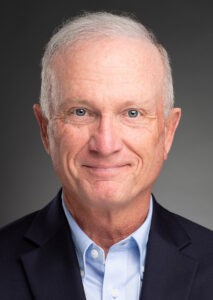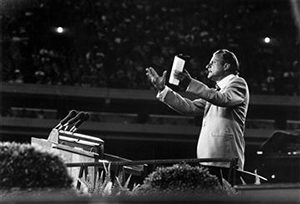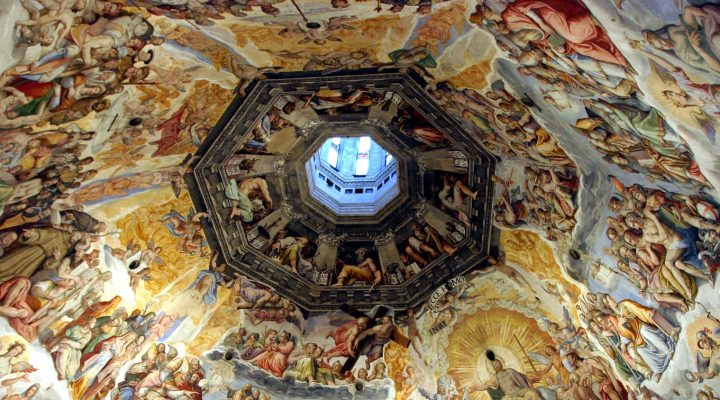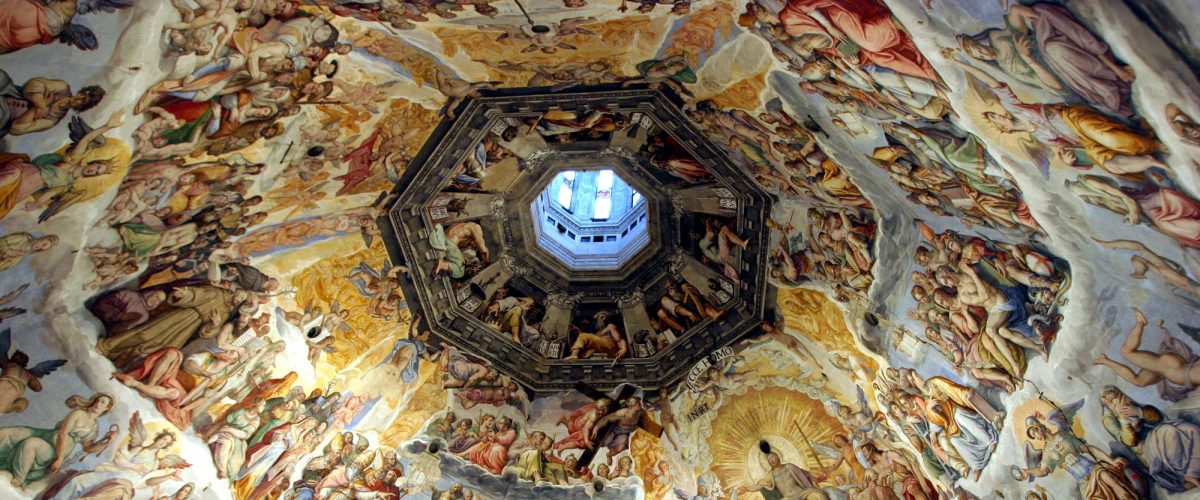Mallory Challis’ recent analysis — “Most Americans believe in heaven or hell, but their ideas aren’t always biblical”— of what people believe about the afterlife begs a question: Which works better to incentivize behavior, heaven or hell? It’s a variation of the age-old question about what works better to motivate behavior, the carrot or the stick.
In The Power of Bad, social psychologists John Tierney and Roy Baumeister address this question, exploring what they dub “the negativity effect,” suggesting that “negative events are more salient, potent, dominant in combinations, and generally efficacious than positive events.” One loss in the stock market may erase several previous gains, therefore looming larger in memory than the gains.

David Ramsey
These authors also suggest it takes four good things to overcome one bad thing. They also point to surveys of folklore and mythology in which there are more references to malevolent gods and demons than to benevolent gods and angels. In short, they make a convincing case that bad is relentlessly stronger than good.
So what about the power of hell vs. heaven?
Putting people in pews has been a perennial problem for preachers for decades. By the early 18th century, only one in five Americans belonged to a church. Moreover, Americans drank alcohol six times a day, on average. Ministers like George Whitfield noted the godlessness of that time and place.
An itinerant evangelist, Whitfield preached in the eastern U.S., from Maine to Georgia. Thousands would listen to his sermons in the closest town square, including more than 30,000 who heard him in Boston. Whitfield’s listeners would shout in anguish, break down in tears, proclaim themselves born again and vow to sin no more.
Historians have called this era the First Great Awakening, and it’s important to understand the ecclesiastical backdrop of that time.
“These ministers didn’t scare the hell out of their crowds, nor did they scare them out of hell into heaven.”
Clergy in that era were well educated (some Ivy League), and their sermons were more cerebral than emotional. Their God was distant and abstract, nothing like the God of the Old Testament who parted the Red Sea and killed Egyptian babies. These ministers didn’t scare the hell out of their crowds, nor did they scare them out of hell into heaven. Many of them didn’t even believe in hell.
George Whitfield sure did.
One of his sermons was titled, “The Eternity of Hell Tormentors.” He asked his audience to picture themselves in hell, tormented by “insulting devils” and “everlasting burnings.”

Jonathan Edwards
Jonathan Edwards, a contemporary circuit evangelist of that era, also believed in and preached about hell. Edwards is best known for his seminal sermon, “Sinners in the Hands of an Angry God.” Yale educated, Edwards compared his audiences to “loathsome insects,” dangling over the fires of hell.
Ezra Stiles, a Congregationalist minister who would become Yale’s president, argued that the revivalist’s strategy was to drive people, “seriously, soberly and solemnly out of their wits.” Mainline churches and their ministers were competing not so much with itinerant preachers like Whitfield and Edwards, but with their primary and favorite subject, hell.
Fast forward to the 1980s. Bishop Richard Wilke of the United Methodist Church urged his members to learn from the fire and brimstone churches:
The churches that are drawing people to them believe in sin, hell and death. If there is no sin, we do not need a Savior. If we do not need a Savior, we do not need preachers. In other words, without the threat of hell, ministers would be “out of luck, out of relevance, and out of a job.”
Perhaps parishioners have enjoyed sermons about a loving and kind deity, but the history of American Christianity suggests what packed the pews wasn’t the love or lure of heaven. It was the fear and power of hell.
“Fear is a powerful motivator.”
Fear is a powerful motivator. It comes from a part of the brain that’s called the amygdala. It makes animals run in herds, and herds remind us that in nature, there’s only two types of animals: the quick and the dead. Those who stay scared are more likely to stay alive.
Herd mentality, also known as mob mentality, suggests people can be influenced by the “herd” to act in ways that are emotional rather than rational. It also can cause otherwise thoughtful people to stop thinking for themselves and follow the crowd.
Maria Konnikova sheds light on this phenomenon in The Confidence Game. She argues that any emotional arousal affects our judgment and decision making, making us unthinking and malleable. She calls it the “affect heuristic,” in which we make decisions based on whether we feel something is good or bad:
It’s perfectly understandable why it’s the favorite approach of many a police interrogator and lawyer, not just con artists. The most primitive parts of our brain take over the rational, … visceral states … create an intense attentional focus. We tune out everything else and tune into the in-the-moment emotional cues. … In these moments you’re less likely to deliberate, more likely to just say yes to something without fully internalizing it. … (It’s a) in-the-moment arousal.

Billy Graham
Billy Graham seemed to tap into these two phenomena, the fear of hell and herd mentality, in his crusades, which were as formulaic as they were popular. George Beverly Shea would gin up emotions with his stirring rendition of “How Great Thou Art.” Next, Graham’s sermons would build to an emotional crescendo, followed by a simple yet scary question: “If you died tonight, would you go to heaven or hell?” Who wants to spend an eternity in hell? And what if I die tonight? Yikes!
With the crowd’s amygdala on high alert, and the first chords of “Just As I Am” playing softly on an organ, Graham would ask people to come to the front to accept Christ as Savior and ensure their place in eternity. Hundreds in attendance would leave their seats and walk down their aisles toward Graham. But there was an insidious wrinkle to this mass movement: Many of those in attendance already were Christians, invited by Graham’s well-oiled organization weeks before the crusade. So those Christians mingled with the unsaved to create the impression of a mass conversion.
“Perhaps Graham knew about herd mentality, that there is not only strength, but salvation, in numbers.”
Perhaps Graham knew about herd mentality, that there is not only strength, but salvation, in numbers. Perhaps he also knew about the power of bad.
My academic study of the afterlife in ancient Near Eastern literature and culture has led me to conclude that heaven and hell are literary constructs, created by a primitive people trying to make sense of their existence. The Israelites of the Old Testament didn’t believe in life after death, only death after death in a shadowy, nebulous existence known as sheol. And the word that translates as “hell” in the New Testament, gehenna, referred to a notorious and literal valley outside of Jerusalem where children had been sacrificed to the gods and where garbage continually smoldered.
My agnosticism has led me to conclude I don’t and can’t know what happens after I die, and this worldview is far from a herd mentality. To the contrary, my beliefs about the afterlife (and this life) are an outlier for which I and others like me are criticized, if not ostracized, which I’ve written about here.
I will not be scared out of hell and into heaven. Neither the carrot nor the stick informs my religious worldview or motivates my behavior. Trick or treat is for Halloween. Leaning into Santa Claus, I simply try to be good for goodness’ sake.
David Ramsey was a Baptist minister for 10 years. He holds degrees from Wake Forest University, Duke University, and he was named a Fellow in Religion and Leadership Development at Princeton Theological Seminary. Ramsey is currently a principal with the world’s largest cloud technology company, AWS, and a published author. His author’s website is dbramsey.com
Related articles:
Most Americans believe in heaven or hell, but their ideas aren’t always biblical | Analysis by Mallory Challis
Heaven-or-hell theology may be simple, but it is neither biblical nor morally defensible. What’s the alternative? | Opinion by Alan Bean
Pew study offers some surprising insights to American views on suffering, salvation, heaven and hell


